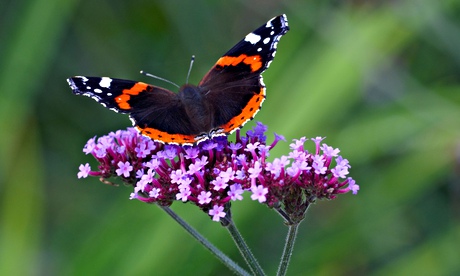
Calico Drum,
The Grasshoppers come,
The Butterfly, Beetle, and Bee,
Over the ground,
Around and around,
With a hop and a bound ...
Edward Lear’s “Calico Pie” has always struck me as powerfully affecting, and so I would have already been drawn to this book – as it is about butterflies, beetles and bees (not grasshoppers so much, but you can’t have everything) – even if it had not been written by one of my favourite nature writers, Dave Goulson, professor of biology at the University of Sussex. His earlier book, A Sting in the Tale, about bumblebees, I enthusiastically reviewed in this column a year ago, and I’m glad to see another appear so soon. His energy is not reserved solely for writing: each chapter in the latest book is headed, Bridget Jones style, with an italicised account of how quickly he completed his morning run of 5.8 miles, and who and what he met along the way. (Curiously, all other measurements are metric, except for a terrible proofreading slip in the first line of the first chapter: “We inhabit a spherical rock, just 13,000 kilometres miles [sic] across”. It’s shocking for a major publishing house to let this kind of mistake get to paperback stage.)
This is, perhaps, a more serious and in some ways melancholy book than A Sting in the Tale. But I’m using such terms relatively: for Professor Goulson is a most amusing writer, which makes the times when he is being minatory all the more striking. His comic technique is the deftly inserted word. He talks at one point about that calculation our genes are said to make, or that we make on behalf of our genes – the one that suggests that we would sacrifice our life for three siblings, we would be evenly split on doing so for two, and we would not do so for one, because of the proportion of genes they share with us. I had never been wholly convinced of this idea, but he mentions wills or kidnapping as analogies for such behaviour in real life, which bring home the point very well. He had just been talking about how aphids and bees reproduce, the former asexually: “I am getting perhaps a little off the point; aphids and bees do not make wills, and they do not generally get kidnapped.” It is the “generally” that makes us laugh.
And it is laughter, or rather the joy of life that is expressed by laughter, that knits A Buzz in the Meadow together. Unlike his last book, it is not about one thing (although I am delighted to see the return of my favourite naughty-sounding bee, the ruderal bumblebee) but many. Subjects covered include the sex lives of flies (when one lands on your shoelace, it is so stupid and/or randy that it is actually trying to have sex with it) and other insects, such as the deathwatch beetle, which ejaculates staggering amounts of sperm, the human equivalent of 14 litres; the evolution of butterflies (give this book to a creationist, if you know any); and the effect of neonicotinoid insecticides on the environment. It is this that sets him off on his most resonant and uncomfortable chapter, “Easter Island”, in which he uses, after Jared Diamond, the example of the famous remote settlement to describe our own future on Earth if we continue our stewardship in the same slipshod and thoughtless way. If you have any notions about primitive humanity living in harmony with the planet, prepare to shed them. We are not only awful now; we always have been. And the possible extinction of insects will be disastrous for us all; and, of course, immeasurably more disastrous for them. Remember how the lines that follow from the Lear quote given above go:
But they never came back to me!
They never came back!
They never came back!
They never came back to me!
• To order A Buzz in the Meadow for £7.19 (RRP £8.99) go to bookshop.theguardian.com or call 0330 333 6846. Free UK p&p over £10, online orders only. Phone orders min P&P of £1.99.

